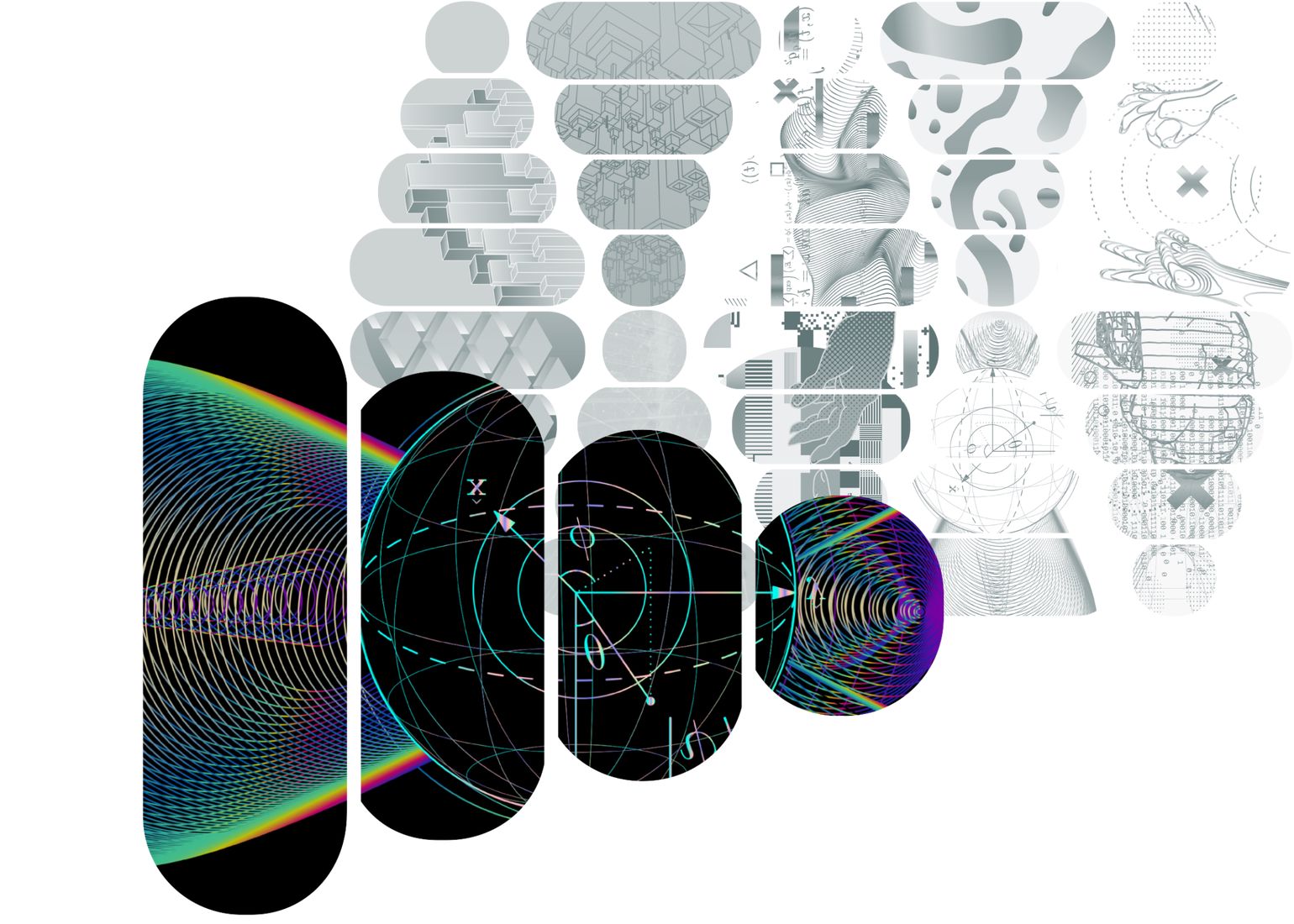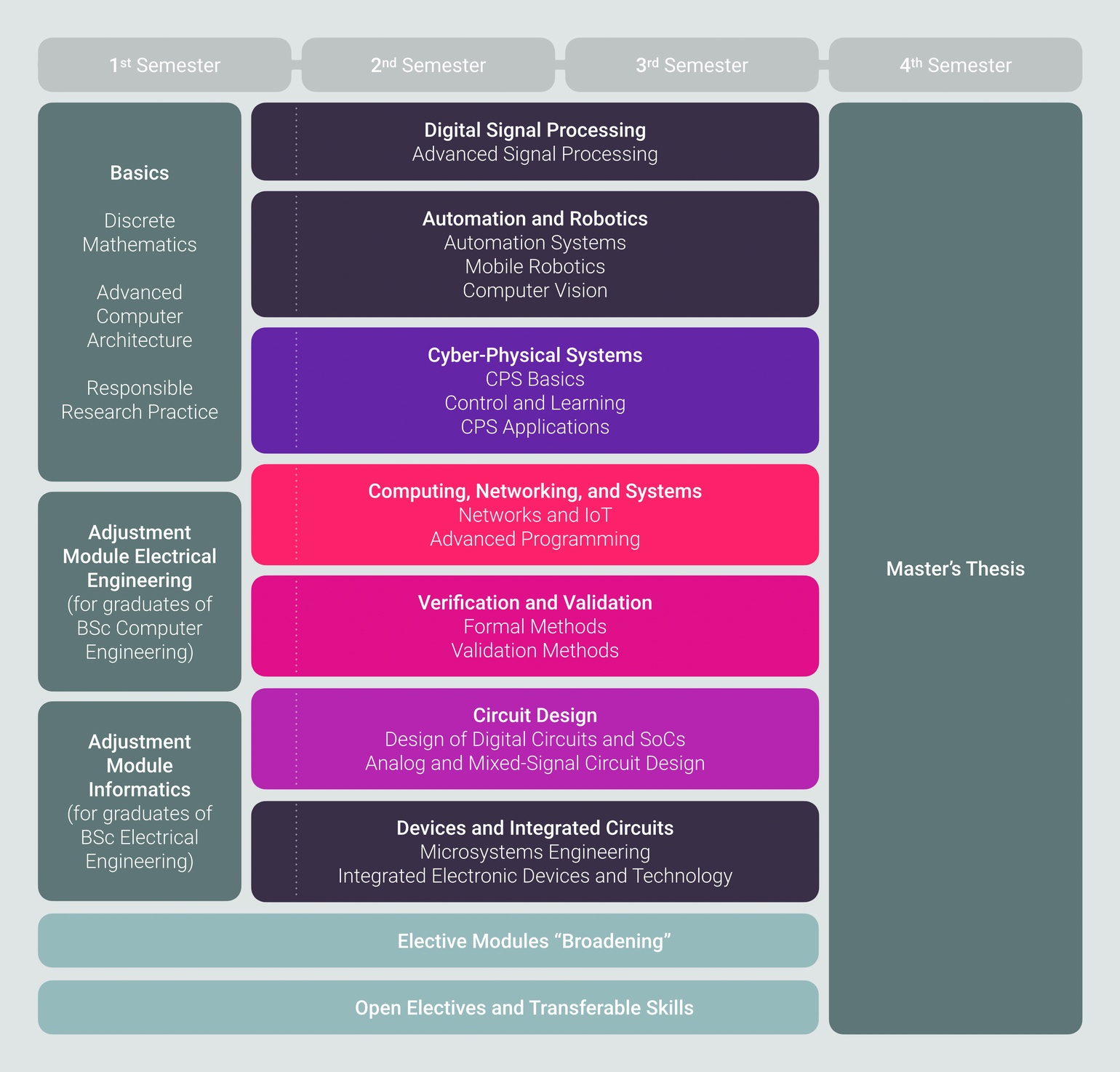Master Embedded Computing Systems
Embedded Computing Systems power everything in today’s interconnected world. If you want to learn the skills to build and create tomorrow’s technologies, this master’s program, jointly offered by the faculties of Informatics and Electrical Engineering and Information Technology, is the right master’s program for you!

Facts
- Duration: 4 Semesters
- ECTS: 120
- Degree: Dipl.-Ing. (equivalent to MSc)
- Language: English
- Curriculum: PDF / Courses
- Questions? — We have answers
Diese Seite in Deutsch.
About
Computing systems are embedded in almost all technical domains, from smart watches, autonomous cars, airplanes, health devices, to large-scale industrial automation systems. These systems deploy hardware devices that are based on a sophisticated circuit design of digital and analog components. Smart systems require close interaction with other devices and the physical world through complex networks, sensors, and actuators in a timely, safe, and secure way. Designing these systems requires a broad understanding of the mathematical foundations, the hardware, the software, the applications, and their interaction with the physical world. Our master’s program Embedded Computing Systems, jointly offered by the faculties of Informatics and Electrical Engineering and Information Technology, will equip you with theoretical and practical engineering skills to design advanced circuits and build tomorrow’s embedded and cyber-physical systems.
What to expect?
This program covers the essential theoretical foundations needed to understand the complexity of modern circuits and interconnected systems, along with the engineering skills to design and build innovative solutions. Its interdisciplinary approach lets you explore a wide range of topics—from analog and digital circuit design to embedded and cyber-physical system development. The flexible structure allows you to specialize in areas like integrated devices, advanced embedded software, machine learning, automation, digital signal processing, and more. You’ll also gain a strong foundation in trustworthy systems through courses in verification and validation. You’ll learn from the best and will be integrated into an international research community, and a good balance between teachers and students helps you to reach your full potential.
Why all this?
Throughout this master’s program, you’ll acquire in-depth knowledge in core concepts and methods of Computer Science and Mathematics, Computer Engineering, and Electrical Engineering. Your knowledge of scientifically sound methods lets you apply an integrative view, select suitable methods for modeling and abstraction, and find the best solutions for the engineering challenges. The skills you develop are highly relevant to industries such as semiconductors, as well as technology-driven sectors in automotive, aerospace, and healthcare. As a student, you’ll benefit from interdisciplinary academic excellence as well as longstanding relationships with industry leaders. With a master’s degree in Embedded Computing Systems, you have a bright career ahead of you - not only in terms of salaries but also in shaping a future with trustworthy and secure systems.
Curriculum

The first semester is primarily dedicated to a few Basics, namely, Discrete Mathematics, Advanced Computer Architecture, and Responsible Research Practice. In addition, you can optionally complement your Bachelor-level knowledge by taking some courses from an Adjustment Module. To steer your further studies according to your preferences right from the start, you need to select two Areas (at least one Core Area) among the following:
- Core Areas: Circuit Design (Analog and Digital Hardware), Verification and Validation, Computing, Networking and Systems, and Cyber-Physical Systems
- Extension Areas: Devices and Integrated Circuits, Automation and Robotics, and Digital Signal Processing
Every area consists of a catalog of mandatory courses, where you have to pick a few, and a collection of optional courses covering theoretical, engineering and lab courses. Typically taken in the course of the second and third semesters, they will allow you to deepen and broaden your knowledge and skills in the selected areas. The program is complemented by a rich set of elective courses that allow you to broaden your scope.
The focus in the fourth semester lies on developing and writing up your master’s thesis as part of a research lab at TU Wien.
Environment
You are deeply immersed in a rich environment full of exciting ideas and interesting challenges that foster your talents and provide new experiences:
- Participate in our student mobility programs! International exchange is in our DNA. Meet students, researchers, and lecturers from all over the world, participate in Erasmus, and join our double degree programs during your Masters.
- Show your excellence! With our TU Wien Informatics Awards, we celebrate outstanding student accomplishments at all levels and share them with the entire TU Wien community.
- Come for the Master; stay for the Doctorate! A master’s degree is the ideal preparation for a doctorate at the TU Wien Informatics Doctoral School. And we are always looking for excellent candidates for open positions in the scientific field.
- Get to know the people and research! We are proud of the distinguished scholars and researchers who make up our diverse faculty. Find out who they are, what projects our research units are working on, and stay in touch through our newsroom and social media channels.
- Enjoy Vienna! Our campus is located directly in the heart of Vienna. Besides Vienna ranking as the city with the highest quality of life and TU Wien Informatics in the Global Top 15% in Computer Science, there are numerous more reasons why you should study with us.
Be part of TU Wien Informatics and help us shape the technologies of the future - today!
